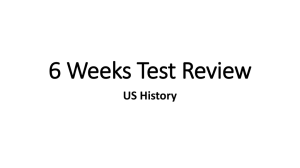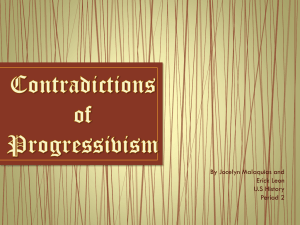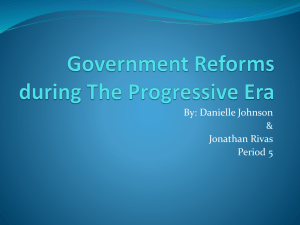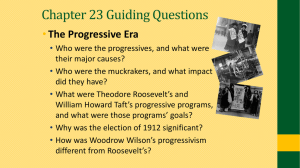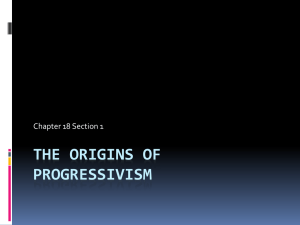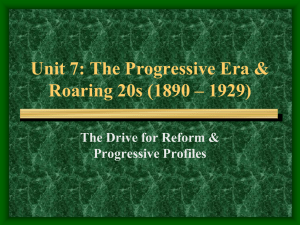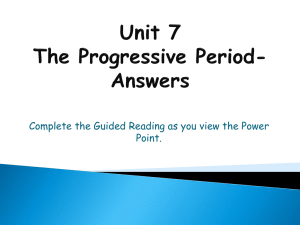File
advertisement
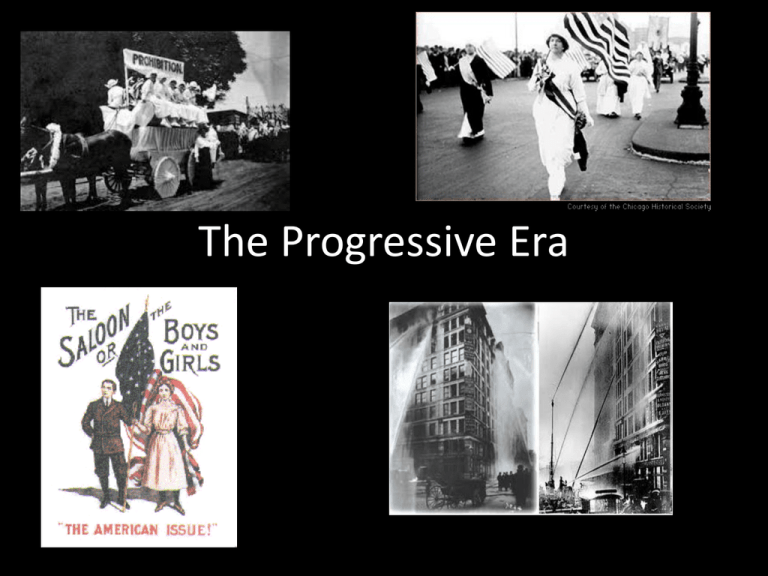
The Progressive Era Daily opener • What were 4 of the main issues citizens are concerned about when voting? Daily opener • Name three of the most fascinating Presidents. • Why did you select each one? • US. 10 Analyze the similarities and differences between the ideologies of Social Darwinism and Social Gospel. Social Gospel vs. Social Darwinism • Christian faith practiced as a • The theory that individuals, call not just to personal groups, and peoples are conversion but to social subject to the same reform. Darwinian laws of natural selection as plants and animals. Now largely discredited, social Darwinism was advocated by Herbert Spencer and others in the late 19th and early 20th centuries and was used to justify political conservatism, imperialism, and racism and to discourage intervention and reform. Reading Activity: • US. 12 Explain the characteristics and impact of the Granger Movement and Populism, including the problems between farmers and the railroads, the call for banking reform, support for a graduated income tax, and regulation of public utilities. • Read article aloud on the Grange Movement • http://www.gilderlehrman.org/history-byera/populism-and-agrariandiscontent/resources/grange-movement-1875 US. 17 Analyze the goals and achievements of the Progressive movement, including the following: Adoption of the initiative, referendum, and recall, adoption of the primary system, 16th amendment, 17th amendment, and impact on the relationship between the citizen and the government. Daily opener • List three political reforms that occurred during the Progressive Era and pick one to describe. • Which TN leader was AGAINST women’s suffrage? • • US.19 Analyze the significant progressive achievements during the administration of Woodrow Wilson, including his New Freedom, the Underwood Tariff, the Federal Reserve Act, and the Clayton Anti-Trust Act. • US.21 Analyze the impact of the Great Migration of African Americans that began in the early 1900s from the rural South to the industrial regions of the Northeast and Midwest. The Progressive Era • 1890-1920 • Turn of the 20th century • Time of political, social, and economic change and reform in the US Progressives • Those who supported reforms during the Progressive Era • Tended to be white, middle class, and Protestant Progressives • Called for regulation of business, improved wages for worker, and regulations over work environments Progressive • Raged against upper class • Looked down on lower class 1. Women’s Suffrage • • US.18 Describe the movement to achieve suffrage for women, including its leaders, the activities of suffragettes, the passage of the 19th amendment, and the role of TN in the suffrage effort (Anne Dallas Dudley, Harry Burn, Josephine Pearson, ‘Perfect 36’) 1. Women’s suffrage • Suffrage – right to vote • Susan B. Anthony – most recognized leader of the movement • Organized rallies and parades • 19th amendment officially became part of the US constitution in 1920 Susan B. Anthony • http://www.biography.com/people/groups/act ivists-womens-rights-activists • Recognize the role of TN in the women’s A. The Perfect 36 • Tennessee and the states before it that voted in favor of women’s suffrage became known as the perfect 36 B. Anne Dallas Dudley • Important activist in the women’s suffrage movement • Played a key role in campaigning for the ratification of the 19th amendment C. Harry Burn • TN General Assembly locked in a tie • Burn planned to vote NO until he received a letter from his mother. • He voted in favor of women’s suffrage and the 19th amendment had the ‘perfect 36’ necessary to become part of the constituion D. Josephine Pearson • Born in McMinnsville, TN • Leader of the anti-suffrage movement in TN • Teacher and administrator, held a Master’s Degree Daily Opener What was Tennessee’s role in the women’s suffrage movement? How did Progressivism happen? • https://www.youtube.com/watch?v=tfUYi8eh LMk&list=PLX32WBn4JAMIOp6lLEFvOU96Yfu A8bZSs • (pass out handouts) • Finish Questions on W.E.B. Du Bois • The Souls of Black Folk 2. Regulation of food and drug • 1906 Congress passed the Pure Food and Drug Act and the Meat Inspection Act – Regulated the food and drug industries – Required accurate labeling of ingredients, strict sanitary conditions, and a rating system for meats • Led to the creation of the Food and Drug Administration- FDA – FDA – still in charge of safety regulations • The Jungle – Upton Sinclair • Exposed nasty meatpacking conditions • https://www.youtube.com/watch?v=Xxe9nos WawM 3. Political Reforms • US.17 Analyze the goals and achievements of the Progressive Movement, including the following: – Adoption of the initiative, referendum, and recall – Adoption of the primary system – 16th amendment – 17th amendment – Impact of the relationship between the citizen and the government • Finish Progressive Era clip • https://www.youtube.com/watch?v=i0Q4zPR4G7 M • Longer Progressive Clip: • https://www.youtube.com/watch?v=zztBdclkYU&list=PLX32WBn4JAMKZFHC8NExGT2B KijKYp3h4 a. Initiative • Allowed citizens to force a vote on certain issues without having to wait on public officials to bring it up. b. Referendum • Citizens could vote directly on proposed laws rather than having political leaders make all of the decisions c. Recall • Citizens have the power to remove officials from office d. Adoption of the primary system d. 16th amendment • An amendment to the US Constitution, ratified in 1913, authorizing Congress to levy a tax on incomes • https://www.youtube.com/watch?v=axKDFOV Wb6c e. 17th amendment • An amendment to the US Constitution providing for the election of two US Senators from each state to be selected by popular vote and a term of 6 years Impact on the relationship between the citizen and the government • What was it? Research Groups & Impromptu Presentations over: (standard US.15) • • • • • • • Samuel Gompers Eugene Debs Haymarket Affair Pullman Strike Coal Creek Labor Saga Blacklisting Open vs. Closed Shop • Research Time = 11 minutes • Write down notes about your topic. • Decide who is going to present which facts to the class. • Everyone needs to talk. • Tell the class the significance of your topic. • US.14 Describe working conditions in industries, including the use of labor by women and children. 4. Protection of workers’ rights • Progressives also demanded reforms in the workplace – 1911 Triangle Shirtwaist Factory Fire • 146 deaths • Locked exits • Fire escape collapsed • https://www.youtube.com/watch?v=4ulaG9x4GpE • Angry progressives demanded action. • By 1920, most states had established workers accident insurance programs, • Eventually reformers convinced legislators to: set limits on how young workers could be restricted hours created safer working conditions Ending child labor • http://www.history.com/topics/childlabor/videos/the-fight-to-end-child-labor Most Dangerous Jobs Today Decreasing • In 1992, 6,217 fatal work injuries occurred. • In 2013, that number dwindled to 4,383. • http://newsfeed.time.com/2014/01/15/theseare-the-top-10-most-dangerous-jobs-in-the-us/ US.19 Analyze the significant progressive achievements during the administration of Theodore Roosevelt including the Square Deal, ‘trust busting’, the passage of the Pure Food and Drug Act, the Meat Inspection Act, and support for conservation. Daily openers • What are some of the most deadly jobs in America? On a sheet of paper, write: • • • • Your name, period, date Topic of your project At least 20 good facts on your topic The answers to the following questions: – Why is your topic important to history? – What impact did your topic/event make on history? – How is your topic still impacting the world today? Progressive Era Presidents Number Name Terms Party 25th William McKinley 1897-1901 Republican 26th Theodore Roosevelt 1901-1909 Republican 27th William Howard Taft 1909-1913 Republican 28th Woodrow Wilson 1913-1921 Democrat 5. Antitrust Supreme Court decisions • Rockefeller and several associates created the Standard Oil Trust in 1890 – Controlled the oil industry – Severely limited market competition – Many Americans demanded government intervention. • In response, Congress passed the Sherman Antitrust Act – Did not allow any combination of companies that would limit trade and commerce – During the Progressive Era, a number of trusts ended after the government challenged them in court. 6. Progressive Era Presidents Number Name Terms Party 25th William McKinley 1897-1901 Republican 26th Theodore Roosevelt 1901-1909 Republican 27th William Howard Taft 1909-1913 Republican 28th Woodrow Wilson 1913-1921 Democrat • “I do not believe there ever was any life more attractive to a vigorous young fellow than life on a cattle ranch in those days. It was a fine, healthy life, too; it taught a man self-reliance, hardihood, and the value of instant decision ... I enjoyed the life to the full.” • —Theodore Roosevelt m http://www.history.com/this-day-inhistory/theodore-roosevelt-shot-inmilwaukee Theodore Roosevelt • Born in New York • Sickly childhood • doctors discovered that he had a weak heart and advised him to get a desk job and not strain himself • Affluent family • After his dad’s death, Teddy threw himself into his studies at Harvard and later at Columbia Law School. • On February 14, 1884, his mother and wife died. • He would later remarry Edith Carow, a childhood friend, and land the prestigious job as the Assistant US Navy Secretary but resigned from that post to lead a volunteer unit known as the Rough Riders in battle during the Spanish American War (1898). • He led in a bold charge up San Juan Hill in the Battle of San Juan Heights, in 1898. • A war hero, and nominated for the Medal of Honor, Roosevelt was elected governor of New York in 1898. • Was McKinley’s VP • McKinley was assassinated by an anarchist making Teddy the youngest President ever Teddy was also nicknamed the ‘Trust Buster’ • dedicated to prosecuting monopolies under the Sherman Antitrust Act • "Square Deal"—a domestic program that embraced – reform of the American workplace – government regulation of industry and consumer protection – with the overall aim of helping all classes of people • the first president to entertain an AfricanAmerican, Booker T. Washington, as a guest at the White House • deemed the country's first environmentalist president • Published 25 books about a range of subjects, including history, biology, geography and philosophy Conservation • Roosevelt protected wildlife and public lands by creating the U.S. Forest Service and establishing 51 Federal Bird Reservations, 4 National Game Preserves, 150 National Forests & 5 National Parks. • TR protected approximately 230,000,000 acres of public land. Theodore Roosevelt • http://www.biography.com/people/theodoreroosevelt-9463424 • Page 234-25 infographic Reading Quiz 1. While the focus on ________________________________ as the agent of change was a hallmark of this early twentieth century reforming spirit, there was never a singular ideology underpinning the reform activities. (This was a theme during the essay pertaining to its role in protecting the human welfare.) 2. List three characteristics used to generally describe the Progressives. 3. Who was a pioneer of photojournalism who compiled photographic images of NYC's slums in How The Other Half Lives? 4. List 3 reformers mentioned in the article. 5. Describe the incident that occured in 1911 and why this angered Progressives. Quiz- You may use notes. 1. List three political reforms that occurred during the Progressive Era. 2. Describe one of the political reforms. 3. Who wrote The Jungle? 4. What were two reforms made for workers during the Progressive Era? 5. When was the Progressive Era? 6. Generally, progressives were white, ______________, and ________________. Ryan, Sydney, Ruchi, Mario Women make progress page 221 Stop at Reformers Champion Working Women’s Rights Ben, Blake, Zach, Juan Women Work for Changes in Family Life Stop at Women Fight for the Right to Vote But include the Ida B. Wells History Makers Box Justin, Aaron, Robby, Chris Women Fight for the Right To Vote & Catt Takes Charge of the Movement Zach C, Sadie, Tobias, Alexis Activists Carry on the Struggle Wade, Jeremiah, Jasmine, Michelle The Nineteenth Amendment Becomes Law Everyone Look at Suffragists Win the Right to Vote on pages 224-225 5th needs to complete Groups: Ch. 8 Sect. 4 starts on page Roosevelt’s Square Deal – stop at Trustbusting and Regulating Industry 233 Ben, Blake, Zach, Juan Trustbusting & Regulating Industry (just Group Members Section & Assignment Ryan, Sydney, Ruchi, Mario page 235)& Infographic on pgs. 234-235 Justin, Aaron, Robby, Chris Roosevelt Enforces the Sherman Antitrust Act & Regulating Food and Drug Industries Zach C, Sadie, Tobias, Alexis The Government Manages the Environment & National Land Conservation (237) stop at Roosevelt Changes Water Policy Wade, Jeremiah, Jasmine, Michelle Roosevelt Changes Water Policy to Roosevelt Strikes Back READ THE ASSIGNED SECTION. ANSWER: Evaluate the main themes and people from your section. Be prepared to summarize for the class. What significance to history did these events/people play? Are there any similarities to today? • As a group, answer questions 3-7 • Turn in • Discuss • US.16 Citing textual evidence as appropriate, explain the significant roles played by muckrakers and progressive idealists, including • Robert La Follette • Ida Tarbell • Lincoln Steffens • Upton Sinclair 7. Muckraker • Investigative journalist who exposed corruption Upton Sinclair • Upton Sinclair – Exposed working conditions and poor sanitation in the meat packing industry – The Jungle Robert La Follette • • • • Civil Rights Activist Women's Rights Activist Anti-War Activist U.S. Representative Ida Tarbell • Ida Tarbell was an American journalist best known for her pioneering investigative reporting that led to the breakup of the Standard Oil Company’s monopoly. Lincoln Steffens • Journalist • Steffens's particular niche was the relationship between corruption and government • Step 1:Research & Create a Short Biography over your assigned person. Include their career, ideas, and accomplishments. Facts like the date of their birth and their spouse’s name are not needed for this bio. Be sure to include facts about your person’s career and ideas on the Progressive Era. • • • Levels of Compatibility • If you saw them at Wal-Mart, what would you do? • 5- Extremely Compatible • Scream for joy and Hug them • 4- Very Compatible • Wave Excitedly • 3-Compatible • Smile • 2-Kinda Compatible • Half a head nod • 1-Not Compatible at all • Run and hide behind the greeting cards • • 5 – Extremely Compatible • 4-Very Compatible • 3- Compatible • 2- Kinda Compatible • 1- Not Compatible at all Agenda • Daily opener • Finish speed dating game – You and your partner give us a quick summary of your person. – Who were you most compatible with? – Least? • Finish Notes & Clips • Tuesday/Wednesday – Project Work Day, Bring all of your materials to class! • Lauren & Sierra – I need to talk to you. Daily Opener • Describe what you think is happening in the picture. 8. Temperance Movement • By 1830, the average American over 15 years old consumed nearly seven gallons of pure alcohol a year. (3xs today’s average) • Alcohol abuse (primarily by men) was wreaking havoc on the lives of many, particularly in an age when women had few legal rights and many were utterly dependent on their husbands for sustenance and support. • http://www.pbs.org/kenburns/prohibition/ro ots-of-prohibition/ • First video on left • Many abolitionists, who were fighting to end slavery, began to see drinking as an evil as well. • US.37 Explain the background of the Temperance Movement, the passage of the 18th amendment to the Constitution and the Volstead Act, the impact of Prohibition on American society and its successes and failures, including the rise of organized crime, bootlegging and speakeasies, and repeal by the 21st amendment. 8. Temperance Movement • wanted to make alcoholic drinks illegal • In 1919, supporters of the temperance movement won passage of the 18th amendment which would become known as Prohibition. – Prohibited the sale and manufacturing of alcohol – Only amendment to be repealed – http://www.history.com/topics/womenshistory/womans-christian-temperanceunion/videos/america-goes-dry-with-prohibition • http://www.pbs.org/kenburns/prohibition/ro ots-of-prohibition/ Al Capone • Coroner’s Report – Al Capone • http://www.biography.com/people/marcusgarvey-9307319 9. African Americans and the Progressive Era • Different leaders within the African American community arose in the late 19th and early 20th century. Although, they shared a common goal of improving the lives of African Americans they often differed over how to best achieve such goals. Booker T. Washington W. E. B. Du Bois Marcus Garvey Atlanta Compromise The Souls of Black Folk ? Accepted segergation Helped found NAACP Marcus Garvey • orator for the Black Nationalism and PanAfricanism movements. Garvey advanced a Pan-African philosophy which inspired a global mass movement, known as Garveyism. African Americans and the Progressive Era (1890-1920) • Shared a common goal of improving the lives of African Americans • Often differed over how to best achieve such goals Booker T. Washington 1856 - 1915 “I will permit no man to narrow and degrade my soul by making me hate him.” ― Booker T. Washington “No race can prosper till it learns that there is as much dignity in tilling a field as in writing a poem.” ― Booker T. Washington Booker T. Washington • Formerly a slave • Founded Tuskegee Institute after the Civil War • Tuskegee trained African Americans to master a trade so that they could achieve economic freedom. • Encouraged AAs to work as teachers, farmers, and manual laborers so they could gain economic independence Atlanta Compromise – Speech Booker gave in Atlanta • “In all things that are purely social we (whites and blacks) can be as separate as the fingers, yet one as the hand in all things essential to mutual progress.” Booker T. Washington • Accepted segregation • Believed African Americans needed to become self-sufficient in a segregated society • pull yourself up by your bootstraps” • http://www.biography.com/people/booker-twashington-9524663/videos/booker-twashington-mini-biography-11188803909 W. E. B. Du Bois Rejected much of Booker T. Washington’s philosophy Believed blacks should strive for success in academic fields, intellectual pursuits, and white collar jobs Resented segregation Harvard’s first African American PhD graduate Helped establish the NAACP (National Association for the Advancement of Colored People) W.E.B. Du Bois “Now is the accepted time, not tomorrow, not some more convenient season. It is today that our best work can be done and not some future day or future year. It is today that we fit ourselves for the greater usefulness of tomorrow. Today is the seed time, now are the hours of work, and tomorrow comes the harvest and the playtime.” W. E. B. Dubois • http://www.biography.com/people/web-dubois-9279924/videos/web-du-bois-minibiography-15383107870 Du Bois Primary Source & Questions • The Souls of Black Folk • Audio: https://www.youtube.com/watch?v=uWEQO wbgyYk Du Bois Questions 1. What is the “other world”? 2. What is the problem that Du Bois is rarely asked and rarely answers? 3. Why do the questions go unasked? 4. What metaphors does Du Bois use to describe the difference he feels between his world and the ‘other world’? 5. How did Du Bois view the ‘other world’? 6. What is the double consciousness that Du Bois describes? • Metaphor- a figure of speech in which a word or phrase is applied to an object or action to which it is not literally applicable. • "“I had fallen through a trapdoor of depression,” said Mark, who was fond of theatrical metaphors" What is the “other world”? What is the problem that Du Bois is rarely asked and rarely answers? Why do the questions go unasked? describe the difference he feels between his world and the ‘other world’? How did Du Bois view the ‘other world’? What is the double consciousness that Du Bois describes? Marcus Garvey • Jamaican by birth • Inspired a great sense of racial pride among African Americans • Amassed a following of more than 500,000 people Marcus Garvey • “Back to Africa movement” – Advocated blacks leave the US to found a homeland in Africa – http://www.biography.c om/people/marcusgarvey9307319/videos/marcusgarvey-mini-biography11191875521 Progressive African American Leader today? Relevance to Today • Watch clip • http://www.washingtonpost.com/politics/deci sion2012/president-obamas-acceptancespeech-full-transcript/2012/11/07/ae133e4428a5-11e2-96b6-8e6a7524553f_story.html Partner Quiz 1. Which Progressive black leader was a slave as a child? 2. Which leader helped found NAACP? 3. Which leader encouraged all African Americans to move back to Africa? 4. Which leader was strongly against segregation? Reflective Writing: African Americans in America Today • Briefly write about the progressive black leaders from our notes. Evaluate America’s reaction to electing a black man to a second term as President. Does race matter in the US today? Are some whites still racist? Are some blacks still racist? Have you ever been the target of racism? Create solutions to ending racism in America for your generation. How will you ensure that your children are not racist? Paper Organization Write About Progressive Black Leaders during the Progressive Era and Today ▪ ▪ ▪ ▪ Booker T. Washington W.E.B. Du Bois Marcus Garvey President Obama Racism Today ▪ Is it still around? ▪ Have you ever been the victim of racism or guilty of being racist? Solutions to Future Racism ▪ Ending stereotypes ▪ Not putting up with it ▪ Not encouraging it yourself • US.21 Analyze the impact of the Great Migration of African Americans that began in the early 1900s from the rural South to the industrial regions of the Northeast and Midwest. Great Migration • The Great Migration, or the relocation of more than 6 million African Americans from the rural South to the cities of the North, Midwest and West from 1916 to 1970, had a huge impact on urban life in the United States. • Driven from their homes by unsatisfactory economic opportunities and harsh segregationist laws, many blacks headed north, where they took advantage of the need for industrial workers that first arose during the First World War. Great Migration • http://www.history.com/topics/blackhistory/great-migration • Image & article (notes cover article) Great Migration • As Chicago, New York and other cities saw their black populations expand exponentially, migrants were forced to deal with poor working conditions and competition for living space, as well as widespread racism and prejudice. • During the Great Migration, African Americans began to build a new place for themselves in public life, actively confronting economic, political and social challenges and creating a new black urban culture that would exert enormous influence in the decades to come. • As a result of housing tensions, many blacks ended up creating their own cities within big cities, fostering the growth of a new urban African-American culture. • The most prominent example was Harlem in New York City, a formerly all-white neighborhood that by the 1920s housed some 200,000 African Americans. Harlem Renaissance • The black experience during the Great Migration became an important theme in the artistic movement known first as the New Negro Movement and later as the Harlem Renaissance, which would have an enormous impact on the culture of the era. • The Great Migration also began a new era of increasing political activism among African Americans, who after being disenfranchised in the South found a new place for themselves in public life in the cities of the North and West. Harlem Renaissance • http://www.history.com/topics/blackhistory/great-migration/videos/the-harlemrenaissance Just the Facts: The emergence of modern America • Great review clip over Progressive Era • 30 minutes • Page 229 • Answer Compare questions 1 and 2 • US.20 Analyze the significant progressive achievements during the administration of Woodrow Wilson, including his New Freedom, the Underwood Tariff, the Federal Reserve Act, and the Clayton Anti-trust Act. New Freedom The Underwood Tariff The Federal Reserve Act The Clayton Anti-Trust Act • 7.4 Identify the causes of American involvement in World War I (i.e., security concerns, economic benefits, Wilsonian diplomacy, propaganda).
